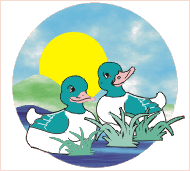 



|
Housing Ducks
Ducks really need to be allowed to roam during the day. They just seem to
be happier when running loose.
However,
like chickens, they need protection from predators at night. Many folks keep their ducks
in the same yard as their chooks, but this is definitely not a
good idea. Ducks are somewhat messy creatures that love making soil into mud and splashing
water around their environment. Chickens on the other hand, do not like wet ground, such
conditions quickly causing diseases in chooks and intestinal worm build-up. Roosters and
bigger hens can totally intimidate lesser aggressive ducks and drakes can sometimes be a
little too amorous with the hens too. So keeping ducks and chooks together is not the way
to go.
A 3
metre x 3 metre shed can accommodate about eight ducks, providing they are not left inside
during the day. Ducks will forage from dawn until dusk and ideally they will be allowed to
do this every day. Furthermore, if you let the ducks out at about 7.30 each morning, most
will have laid their eggs by this time, so gathering the eggs is made easier too. You will
want to have a shed that is easy for you to get in and out of... remember the bit about
ducks liking wet ground? Crawling about in mud, trying to collect eggs each day, is a
pastime that soon loses any appeal it may have had at the start! Ideally, the shed will
have a concrete floor to make cleaning easier. Concrete however, is very hard on ducks'
feet, so a thick layer of wood shavings or similar material is needed to cover the entire
surface. This can be raked over eack week to keep it friable and to help create a
bacterial environment which breaks down wastes more quickly. If your shed and surrounds
begins to smell, you will need to evaluate whether you have too many birds, whether the
litter needs changing or adding to and making sure the drainage of the entire site is
adequate to prevent excessive water build-up. Generally speaking, in the southern
hemisphere, the front of the shed is best facing north, where it can gain the winter sun
and get less of the hot summer sun. Conversely, in the northern hemisphere, the shed will
be best facing towards the south. During summer, you may need to spray water over the roof
of the sheds to help keep them cooler inside.
During
the day, the ducks appreciate bushes and low shrubs under which they can shelter from the
sun and wind, from more aggressive peers and from soaring predators like hawks. They also
like fruit trees but are prone to ripping the leaves and lower branches off small trees,
so these need protection until they grow bigger. During the hot summer months, your ducks
will be more comfortable hiding under bushes than sitting in a hot tin shed.
Domestic
ducks are easily confined (except for the odd Muscovy duck that will fly off like an
airforce fighter plane) behind one metre high fences, however higher fences are usually
required to prevent attack from foxes, dogs and other similar predators. |

Copyright
(c) 2006 . All rights reserved.
Reproduction in whole or in part in any form or medium without express
written permission is strictly prohibited. |